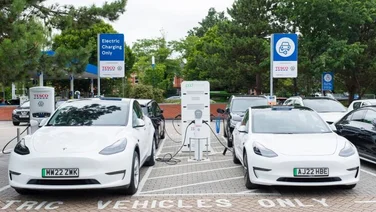Get Free Solar Panel Quotes
Find out how much solar panels would cost you
Do you need solar panels for your home or business?
Fill in our form - Get a free quote - Start saving on energy bills
Why get solar panels?
- Generate free, green electricity
- Reduce your electricity bill by up to 64%
- Get paid for what you don't use
As featured in:



News
The latest news, analysis, guides and opinion.

Octopus Energy integrates AlphaESS batteries with intelligent tariffs
Octopus Energy will include storage batteries from AlphaESS UK in its intelligent tariffs as part of its Zero Bills initiative in a deal designed to offer more value for billpayers.
-
 Drivers can save £1,450 a year by buying a secondhand EV Secondhand electric vehicle (EV) drivers will still save around £1,450 a year, on average, despite plans for a new 3p-per-mile tax on EVs.
Drivers can save £1,450 a year by buying a secondhand EV Secondhand electric vehicle (EV) drivers will still save around £1,450 a year, on average, despite plans for a new 3p-per-mile tax on EVs. -
 How do ground source heat pumps work? For episode 13 we welcomed Stuart Gadsden of Kensa to find out more about ground source heat pumps
How do ground source heat pumps work? For episode 13 we welcomed Stuart Gadsden of Kensa to find out more about ground source heat pumps -
 EV giant offers chance to ‘beat the Budget’ with tax rebate Chinese company Omoda & Jaecoo offers EV tax rebate to help customers following the 3p-per-mile tax announced by Rachel Reeves
EV giant offers chance to ‘beat the Budget’ with tax rebate Chinese company Omoda & Jaecoo offers EV tax rebate to help customers following the 3p-per-mile tax announced by Rachel Reeves -
 How to be sustainable this Christmas Buying gifts with sustainability in mind will help gift buyers reduce the amount of plastic that ends up in landfill.
How to be sustainable this Christmas Buying gifts with sustainability in mind will help gift buyers reduce the amount of plastic that ends up in landfill. -
 Budget: Bills to fall by £150 as Reeves scraps green levies Rachel Reeves has announced she will cut certain green levies in a bid to get bills down.
Budget: Bills to fall by £150 as Reeves scraps green levies Rachel Reeves has announced she will cut certain green levies in a bid to get bills down. -
 Mercedes-Benz releases ‘game-changing’ EVs Mercedes-Benz says its two new CLA models offer more freedom and individuality, as well as more range, for drivers.
Mercedes-Benz releases ‘game-changing’ EVs Mercedes-Benz says its two new CLA models offer more freedom and individuality, as well as more range, for drivers. -
 Heat pumps in homes put less pressure on the grid A new study suggests heat pumps have less of an impact on the National Grid than gas boilers. They also heat homes more efficiently.
Heat pumps in homes put less pressure on the grid A new study suggests heat pumps have less of an impact on the National Grid than gas boilers. They also heat homes more efficiently. -
 How to be sustainable this Black Friday Black Friday has become one of the year's biggest days for shopping, but how can you take part without hurting the planet? Read on to find out.
How to be sustainable this Black Friday Black Friday has become one of the year's biggest days for shopping, but how can you take part without hurting the planet? Read on to find out. -
 What’s the cost of electricity per kWh right now? As the energy price cap changes, you might be wondering how much electricity costs these days. Find out everything you need to know here.
What’s the cost of electricity per kWh right now? As the energy price cap changes, you might be wondering how much electricity costs these days. Find out everything you need to know here.